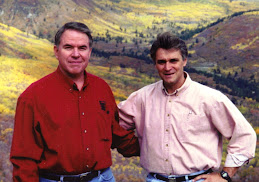Wednesday, August 5, 2009
Another PS Component!
"Self-Check" — a Fundamental Principle of Training and Performer Support
During graduate school, I embarked on a project that inadvertently schooled me in the impressive power of self-evaluation as a principle of instruction. I had just completed a course at the University of San Francisco from Michael Scriven – a thought leader in the practices of performance evaluation. Following, I had developed a training program for an organization and was in the midst of conducting the training when one of the participants said to me, “Why don’t you stick around after class and watch us do our impersonations of you.” I was caught a bit off guard and asked “what do you mean?” His reply: “Every day after class we all take turns impersonating you for the day. Some of us have gotten really good at it.” I stayed that night and watched as every idiosyncrasy I had exhibited that day during the training was magnified out of proportion and turned into hilarious laughter.
That evening, as I drove home, I concocted a plan to force them all to view and evaluate themselves and their peers. I admit the idea was somewhat motivated by revenge but the impact of viewing myself through their eyes had actually been instructional. I developed a performance evaluation tool and trained the class in how to use it to evaluate the performance of others. And then the day of reckoning arrived. I placed every student into a set of fabricated scenarios that were as realistic as they could possibly be and videotaped them. Now, if you know my age, you know that this took place during the emerging days of video technology--so this was a novel idea at the time. I then scheduled sessions for each participant to view his or her performance along with four other peers. They all rated themselves and each other against the 10 performance rating scales I had developed. Where there were discrepancies in the ratings, they discussed and consolidated them into a single rating. It was payday! The result? They had the time of their lives. And what is more, this group ended up exceeding the performance capabilities of any previous group. In addition, as we followed this group into the real world of application, they demonstrated an accelerated performance improvement path that was astonishing.
So, here’s my point. In the discipline of instructional and learning design, we most often view evaluation as something we do to determine if learners achieved what we set out to help them achieve. We measure the merit and worth of the experience. We work to deduce the return on investment as a result. This is all fine and good, but evaluation has much more to offer. It is a principle of instruction not just a practice in the training development process. When we train people how to evaluate their own performance we place them on a path of ongoing improvement. When we provide them tools to ensure that their self-evaluation is objective and deliberate, we ensure that ongoing growth occurs at maximum potential.
I’ve been considering this principle, lately, in the context of the practices of performer support. We have developed great methodologies for developing “sidekicks” and “planners.” And we’re making real headway in learning how to “broker” all our learning assets to accommodate performers at all five moments of need. It seems to me, that there is an additional area to consider – in support of performance. If planners help me prepare to perform and sidekicks assist me as I perform, what do we do to help performers review their performance, determine how they could have performed better, and take the steps necessary to perform better next time they are called upon to act in a similar manner.
It makes sense to me that we should consider this vital part of performance improvement as part of the practices of performer support. It begins by developing self-assessment tools and then bringing those tools into formal training along with our planners and side-kicks. As we have recommended with all other performer support tools, a fundamental objective in formal training is to train performers how to use these performer support tools. This should include learning how to use the self-evaluation tools you create.
If any of you are already doing this, let us know. Provide us some examples we can share with others. This is an idea worth pursuing. We not only need to support performers at all five moments of need, we also need to support them throughout the performance process; before they perform with “planners”, while they perform with “side-kicks”, and after they perform with “self-checks.”
Michael J. Gelb wrote, “Champions know that success in inevitable, that there is no such thing as failure, only feedback.” Self-evaluation can be the most influential form of feedback possible. It ensures persistent growth. It may very well be the most powerful principle of instruction and learning. And it certainly has a vital role to play in performer support.
Subscribe to:
Post Comments (Atom)




If "planners" help us before we perform, and "side-kicks" help us as we perform, perhaps "coaches" can help us evaluate our performance?
ReplyDelete